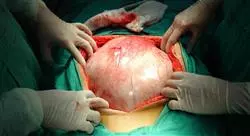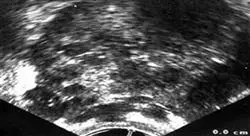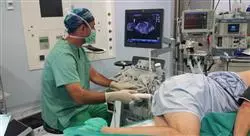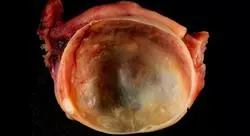University certificate
The world's largest faculty of medicine”
Description
Healthcare professionals must continue their training throughout their careers to make more accurate diagnoses"
The aim of this postgraduate certificate in Tumors of the genito-urinary tract is for students to learn the appropriate concepts and international diagnostic criteria for the correct diagnosis and staging of ovarian malignant neoplasms, following the classification of the World Health
Organization (WHO/IARC 4th Edition, 2014) and the International Federation of Gynecology and Obstetrics (FIGO).
In this way, specialists will be able to update their knowledge of the tools necessary to carry out an effective and personalized differential diagnosis for each patient. Also included is the study of prostate and seminal vesicle pathologies, with the aim of training professionals with solid knowledge in Uropathology, which will contribute to a better understanding of the etiopathogenesis and pathophysiology of the disease and to improve its treatment.
This postgraduate certificate in Tumors of the genito-urinary tract offers the possibility of specializing in the treatment of cancer in the urinary and genital apparatus, both male and female, in order for specialists to acquire the necessary skills to treat oncological diseases that develop in these apparatuses.
The training will allow the development of competencies, skills and abilities for the performance of the profession, taking into account that the patients are children who require different attention and treatment than adults.
This is the best training you can get to stay up to date on the latest developments in the treatment of tumors of the genito-urinary tract"
This postgraduate certificate in Genito-Urinary Tumors contains the most complete and up-to-date scientific program on the market. The most outstanding features of the University Course are:
- The development of several case studies presented by experts in tumors of the genito-urinary tract
- The graphic, schematic, and eminently practical contents with which they are created provide scientific and practical information on the disciplines that are essential for professional
- The latest news on Tumors of the genito-urinary tract
- Practical exercises where self-assessment can be used to improve learning
- Special emphasis on innovative methodologies in genito-urinary tract tumors
- Theoretical lessons, questions to the expert, debate forums on controversial topics, and individual reflection assignments
- Content that is Accessible from any Fixed or Portable device with an Internet Connection
This postgraduate certificate may be the best investment you can make in the selection of a refresher program for two reasons: in addition to updating your knowledge in Genito-Urinary Tumors, you will obtain a postgraduate certificate issued by TECH Global University"
It includes in its teaching staff professionals belonging to the field of genitourinary tumors who pour into this training the experience of their work, in addition to recognized specialists belonging to reference societies and prestigious universities.
The multimedia content, developed with the latest educational technology, will provide the professional with situated and contextual learning, i.e., a simulated environment that will provide an immersive training program designed to train in real situations.
This program is designed around Problem Based Learning, whereby the professional must try to solve the different professional practice situations that arise during the course. For this purpose, the specialist will be assisted by an innovative interactive video system created by renowned experts in the field of genitourinary tumors with extensive medical experience.
Enhance your professional performance and improve your patients' quality of life"
Take the opportunity to learn about the latest advances in Genito-Urinary Tumors and improve the health of your patients"
Objectives
The online postgraduate certificate in Genito-Urinary Tumors is oriented to facilitate the performance of the professional dedicated to medicine with the latest advances and newest treatments in the sector.
This postgraduate certificate will allow you to update your knowledge in Genito-Urinary Tumors, with the use of the latest medical technology and scientific advances to contribute to promote the health and quality of life of patients"
General Objective
- The main goal of this training in Tumors of the genito-urinary ract is that the professional knows the basic principles related to oncology, addressing the tumors that most affect women today, as well as the most cutting-edge treatments and advances
Specific Objectives
- Recognize the characteristics of malignant neoplasms, their classification according a their histogenesis, as well as aspects related to their biological behavior
- Acquire up-to-date knowledge on cancer epidemiological data worldwide
- Learn about screening methods in at-risk populations to diagnose cancerous lesions early
- Recognize the environmental and occupational factors (mutagenic agents) that are directly and indirectly involved in cancer, and the carcinogenic capacity of some toxic substances found in food
- Relate DNA AND RNA viruses known to cause cancer in humans
- Expose the mechanisms by which viruses are able to subjugate the normal activity of host cytoplasmic proteins, affecting key points in the control of the cell cycle, cell growth and differentiation, causing severe alterations in cell growth and cancer development
- Recognize the role of H. pylori bacteria in the pathogenesis of gastric cancer
- Understand cancer as a genetic disease resulting from mutations that accumulate in genes that are critical for the growth and development of somatic cells
- Describe the genes associated with cancer, and the importance of DNA analysis to identify individuals, detect predisposing gene polymorphisms, analyze mutations, and establish the diagnosis of cancer as a genetic disease
- Recognize the susceptibility genes involved in breast, lung, thyroid, colon, skin, bone, pancreatic, and neuroblastoma cancers, and by what mechanism they participate in tumorigenesis
- Know the symptoms and signs that are most frequently related to cancer, as well as the different systems for the staging of tumor disease and their importance
- Know the phases of the cell cycle, the critical control points, as well as the genes involved in its regulation
- Recognize the important role of cell cycle checkpoints and DNA repair systems in maintaining the fidelity and integrity of genome replication and repair, and regulating cell cycle dynamics
- Explain the positive and negative feedback regulatory processes that contribute to cell cycle progression, and the significance of negative controls on cell cycle progression that are present during development, differentiation, senescence, and cell death, which play an
- important role in preventing tumorigenesis
- Identify the difference in gene expression between normal tissue and tumor tissue
- Know the stages involved in the transformation of a normal cell to a malignant cell
- Recognize the malignant phenotype as the result of a characteristic pattern of gene expression, alterations in the function of the human genome, which cause erratic growth, dedifferentiation, invasion, and metastasis
- Characterize the different genes involved in cell cycle regulation (growth-promoting genes, growth-inhibiting genes, genes that regulate apoptosis and genes that repair damaged DNA), and the mutations that alter them
- Explain the key role that oncogenes may play in the development of cancer by directing mechanisms that lead to the development of neoplasms
- Know tumor suppressor genes as cytoplasmic components capable of reversing the tumor phenotype; proteins that control the cell cycle, proliferation, and differentiation
- Identify epigenetic aberrations (DNA methylation with silencing of gene expression, and histone modifications that can enhance or dampen expression), which contribute to the malignant properties of cells
- Recognize the role of epigenetic changes in malignant phenotype, including gene expression, control of differentiation, and sensitivity and resistance to anticancer therapy
- Know the genes and proteins associated with malignant diseases and their utility as tumor markers to define a particular entity, its diagnosis, staging, prognosis, and screening in the population
- Know and apply the different technologies used to analyze the gene expression profile of neoplasms to identify clinical and biological aspects that are difficult to determine by histopathological examination. Its principles, advantages, and disadvantages
- Explain the importance of gene expression profiling for the application of different treatment protocols and the response to them among histologically similar tumors
- Recognize the importance of gene expression profiling in the new classifications of malignant tumors associated with prognosis and response to treatment
- Study of phenotypic expression patterns and molecular pathways involved in carcinogenesis
- Gain in-depth knowledge of the causes and molecular and cellular mechanisms involved in pathophysiology
- Acquire an integrative vision in the diagnosis of neoplastic disease
- Review of developments in the histopathologic classification of ovarian, vulvar, and uterine tumors
A unique, key and decisive training experience to boost your professional development"
Postgraduate Certificate Course in Genito-Urinary Tumors
The Postgraduate Certificate in Genito-Urinary Tumors is a specialized training for medical professionals involved in the treatment of patients with cancer in the genito-urinary tract. Cancer patients are patients with a significant medical complexity, so they need multidisciplinary care by different health professionals. Constant updating in scientific advances is essential to offer more effective diagnoses and treatments and to improve the quality of life of patients. This program focuses on the study of genito-urinary tumors, a pathology that affects an important part of the population and whose diagnosis and treatment requires a high level of specialization. During the program, students will learn the latest advances in diagnostic techniques and treatment of genito-urinary tumors, such as prostate, bladder or kidney cancer.
Improve the treatment of your oncology patients.
The program focuses on practical and theoretical teaching for the management of patients with genito-urinary tumors. Topics such as initial patient assessment, diagnosis, the different treatment techniques available, such as surgery, radiotherapy and chemotherapy, and the necessary follow-up measures to ensure treatment efficacy will be addressed. One of the main objectives of the Postgraduate Certificate in Genito-Urinary Tumors is to train students to work as a team and collaborate with other medical specialists to provide multidisciplinary care and improve the quality of life of patients. Students will have the opportunity to work alongside oncologists, radiologists, urologists, nurses and other healthcare professionals, learning to coordinate and optimize patient treatment. In conclusion, the Postgraduate Certificate in Genito-Urinary Tumors is essential training for medical professionals seeking to improve their knowledge and skills in the diagnosis and treatment of tumors of the genito-urinary tract.











